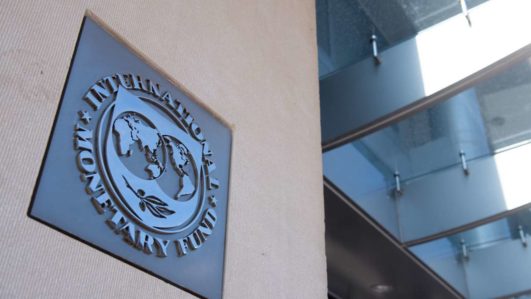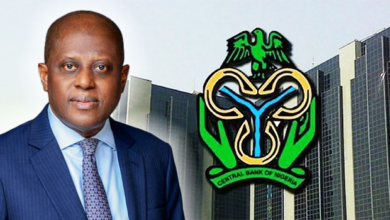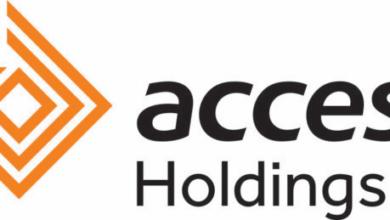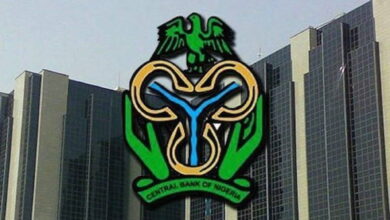IMF approves $3.4 billion for Nigeria’s emergency funding

(FILES) In this file photo taken on April 15, 2020 a sign is seen outside the headquarters of the International Monetary Fund (IMF) as the IMF and World Bank hold their Spring Meetings virtually due to the outbreak of COVID-19, known as coronavirus, in Washington, DC. The IMF board on April 28, 2020 approved $3.4 billion in emergency financing for Nigeria to help deal with the economic damage inflicted by the coronavirus pandemic.<br />The loan aims “to support the authorities’ efforts in addressing the severe economic impact of the COVID-19 shock and the sharp fall in oil prices,” the IMF said in a statement. SAUL LOEB / AFP
• Senate backs FG’s N850b loan request
• Germany gives €22.4m debt relief
• Speaker seeks diversification of economy
• Experts task govt on spending
The International Monetary Fund (IMF) yesterday approved Nigeria’s $3.4 billion emergency loan request to assist the country tackle the impact of the coronavirus (COVID-19) pandemic.
The loan, to be repaid within five years, is the largest allocation yet by the IMF to an African country’s bid to contain the pandemic.
Hit by crashing oil prices and lockdowns, Nigeria requested the amount, which is the total of its existing holding with the IMF, under the Rapid Financing Instrument, which offers funding without the strings of a full programme.
Without the loan, Nigeria’s economy could shrink drastically, as the collapse of the price of crude, which makes up more than half of government revenues and 90 per cent of exports, has made it difficult to finance the 2020 budget.
IMF’s Managing Director Kristalina Georgieva had said last week that the fund would mobilise more than $18 billion for more than 40 African countries that requested assistance to battle the pandemic.
As at April 15, 2020, up to a hundred countries had approached the IMF for similar support under its rapid financing instrument. They urged the fund to ramp up crisis response for emerging markets and developing countries to mitigate the impact of the pandemic.
This was as the Senate, without a dissenting voice, yesterday gave accelerated approval to the request by President Muhammadu Buhari to access a fresh loan of N850 billion from the domestic capital market.
The approval came less than five minutes after Senate President Ahmad Lawan read the request to the lawmakers at the plenary session.
To achieve the immediate approval of the president’s request, the Senate suspended order one of its standing rules, which stipulates that such a request be referred to the relevant committee for thorough parliamentary deliberation.
Buhari had in a letter to the Senate president stated: “To ensure that there are adequate funds to finance critical projects and programmes in the 2020 budget, I hereby seek the Senate’s approval by resolution to raise the N850 billion of new external borrowing in naira from the domestic capital market instead of from the international capital market.”
The president lamented the inability of the Federal Government to seek the loan from the international capital market, which according to him would have been more beneficial. He also drew the attention of the Senate to provisions in the 2020 national budget, which empowered government to raise the loan to fund the capital budget.
He said: “The Senate may wish to recall that the 2020 Appropriation Act provided for N1,594,986,700,544 of new domestic borrowing and N850 billion of new external borrowing. These borrowings were to part finance the 2020 budget deficit of 2,175,197,885,232 only.”
He noted that although “external borrowing from the international capital market increases Nigeria’s external reserves, provides access to lower costs as well as avoids crowding out private sector borrowers who also wish to access the domestic capital market, recent developments in the global economic environment as a result of the coronavirus pandemic and the decline in international oil prices have made it less attractive to borrow from the international capital markets at this time.
“However, it remains our intention to access the international capital market when conditions improve to refinance this N850 billion of new borrowing and epitomise the benefits inherent in external borrowing.”
According to him, “The conditions in the domestic capital market are favourable in terms of availability of funds and relatively low interest rates. This cause of action is deemed prudent, given our current realities.”
Buhari informed the Senate that he had “directed the Minister of Finance, Budget and National Planning to make herself available to provide any additional information or clarification which you may require.”
Following the approval by the Senate, Lawan directed the Senate Committee on Finance to liaise with the Minister for Budget and National Planning to get further details on the loan.
Reacting to the development, the Chief Executive Officer of Cowry Asset Management Limited, Johnson Chukwu, said: “It might be difficult for the Federal Government to raise fund externally. So, it is expected at this time because government’s proposed revenue has collapsed. It will therefore not be able to meet its financial commitment if it does not access new funding sources.
“Right now, the external borrowing plan from the private sector cannot materialise due to the current global pandemic. It is a good step in the right direction for government to look at the local market for its borrowing need.”
He explained that the decision would stimulate economic activities and trigger increased volume of transactions in the local bond market.
According to him, “Since it is targeted at infrastructure development, it will have catalytic impact on the economy. When the infrastructure is completed, it will create employment for the people and improve productivity.”
Culled from guardian.ng





